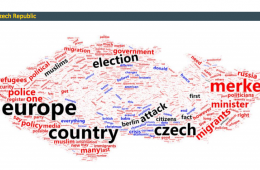Coverage of Angela Merkel in Some CEE Media

GLOBSEC Policy Institute with its partners the Political Capital and European Values are cooperating with the International Republican Institute (IRI) on the Beacon Project.
The Beacon Project aims to support a stronger and broader transatlantic dialogue on how to jointly defend the core values of liberal democracy against threats from both outside and within. Although terrorism and the migrant crisis have, until recently, attracted most of the headlines, in Europe today one of the most serious threats to the democratic order comes from Vladimir Putin’s Kremlin. Across the continent, Russia is in the process of expanding its military and political options by polarizing attitudes among the public in target states. It spreads false information regarding United States and European Union (EU) policies and intentions in order to decrease trust in democratic institutions and public support for closer ties with the Euro-Atlantic community in states both inside and outside of the EU. This campaign of soft-power intervention created the need for a coordinated response carried out by both, the European governments and civil society with an aim to improve communication, strengthen advocacy, and increase outreach within the transatlantic community. The Beacon Project fills this space.
Through the Beacon Project, the International Republican Institute seeks to accomplish four goals:
1. Support a strong transatlantic dialogue
2. Defend pluralistic democracy as a core value of Western democracies
3. Stand against internal and external threats to democracy
4. Re-engage in Europe’s vulnerable regions inside and outside the EU
In order to respond to the Russian soft-power efforts and counter the spread of disinformation, IRI has been developing the Beacon Project’s ICT data collection tool, >versus<. This ICT data collection tool is being developed to aid local media monitors and researchers to obtain qualitative and quantitative data from a wider range of sources. This database will be built by developing a collaborative standardized methodology to provide quality data on the scale and effectiveness of disinformation for the first time. In addition, this data will be further supported by new national polling initiatives.
Until recently, Moscow’s effort to influence public and elite opinion in Europe in favor of its positions had gone largely unnoticed, but the effort is both broad and deep. The Beacon Project’s >versus< ICT tool, in combination with polling, aims to shed light on these efforts by producing data-driven analysis on connections between disinformation and anti-liberal movements, as well as producing sophisticated public-opinion research to obtain a clearer picture of current political weaknesses that allow this exploitation to occur. By providing data and building political alliances for common action – across European governments and civil society, the Beacon Project is helping close the information space exploited by the Kremlin. With Russia’s continuing military effort to destabilize the governments and states of the Eastern Partnership, the need to develop a strong, transatlantic response to the Russian soft-power effort has become even more acute.
Coverage of Angela Merkel in Some CEE Media
IRI analyzed the coverage of Merkel with its three core partners Globsec Policy Institute, Slovakia; Political Capital Institute, Hungary; European Values, Czech Republic. While >versus< is still being fine-tuned and the corresponding methodological framework is being established, the results of this case study largely reflect those that were seen in the German online media space by Buzzfeed. Over all the most shared articles are hyperbolic, disingenuous, or disinformative and designed to stoke fear.
The case study Coverage of Angela Merkel in Some CEE Media is available for download here.
![]()